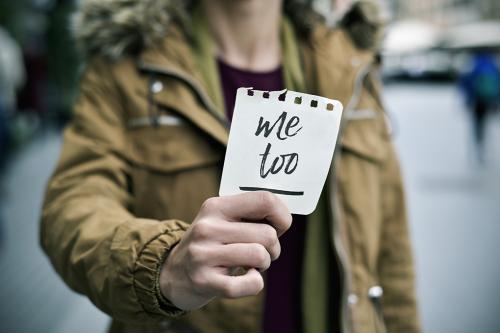What have we learned from #Metoo?

Kenneth Reinicke is an atypical researcher. There are several books in his office with colourful covers and idiomatic, titles such as ‘De unge f?dre’ [The Young Fathers], ‘M?nd i lyst og n?d’ [Men in lust and need] and ‘M?nd: K?n under Forvandling’ [Men: Gender under Change], all with his name on the cover. He does not hide the fact that he would much rather write for a wider audience than for narrow scientific circles. There are also indications that this is a useful strategy, since his latest research project has been startlingly relevant for almost every adult citizen on the planet:
He has investigated why men violate and what types of violators exist, and while the whole world has been shocked by the extent of sexual harassment and assault, Kenneth Reinicke has been able to follow events through a prism of insights from several years of research in an area that can be labelled under the term "men's destructive behaviour".
Three types of violators
Kenneth Reinicke’s research has, among other things, mapped three archetypes among male violators, ranging from 'hardcore', i.e. the most conscious violator, to the 'opportunist', who seizes an opportunity without actually having a planned intention, to the ‘unconscious’, i.e. the bungler, who is simply unable to behave properly and therefore goes much too far. The distinction itself is important for understanding how many different ways a violation can occur, and how differently a situation can be perceived:
?When this field appeared in the 1970s, it was mostly concerned with investigating workplaces and educational institutions, but there is an enormous amount of violations that take place in public spaces, which were not formerly perceived by society to be something criminal. You get the feeling that it has been such a normal feature of life for women to be harassed that there was no inclination to regard it as a problem, because it was simply part of our culture,? explains Kenneth Reinicke, who had expected that a ‘revolution’ like #metoo would occur sooner or later. What he had not expected, was its extent:
?I absolutely never thought that #metoo would be so big. I was doing my research and had read a lot about the subject, but I had no idea how big it would be, and that there would be such a potential for change,? he recalls.
A moment of learning
The change potential he talks about has become a core element of what we can learn from the recent months' focus on sexual behaviour, he believes:
?It's really a moment of learning right now. It is a call for men to think about their behaviour and to change. The best outcome is that we achieve a clarification of what is culturally legitimate to pursue and that we define how we should behave.?
In a slightly broader sense, it is about men gaining an insight into what they have failed to think about until now.
?For example, when I have been out socialising in the city, I have never contemplated the possibility of experiencing a sexual assault on myself. It rarely happens to a man, so I experience #metoo as awareness-raising with respect to a woman's perspective,? explains Kenneth Reinicke.
Of course, every politician will say that it is bad that assaults take place, but nothing more than that has occurred politically.
So, although we can already see that the ‘metoo movement’ has begun to wane, a real change has taken place that we will be able to feel from now on, he believes:
?I think that many people have learned that it's about not allowing your desires to impact those you encounter in the pub or at the workplace. Naturally, you should still be able to flirt, but in a manner that is respectful. If you want to enter into another person's personal space, you must first have their permission. This is some of what we've learned from the metoo movement,? says Kenneth Reinicke, who thinks that the movement will have a far-reaching effect on our everyday life:
?After #metoo, it has become more legitimate to say no, and where a woman might previously have been fobbed off, she will now be listened to. This also means that women have become more aware of what is acceptable. The same applies for men.?

Where are the politicians?
The trend will continue, says the researcher:
?I think that there will be stricter standards institutionally and organisationally and rules will be introduced. That would have an enormous impact on us all. Even here at RUC, an e-mail has now been circulated, encouraging people to report if they have experienced harassment or abuse. This is important, because research shows that the senior management's signals and actions have a major impact.?
However, Kenneth Reinicke is also not afraid to direct criticism at the people that, perhaps more than anyone, have the opportunity to make a difference and to remedy the massive problems that many women have experienced over the years:
?Although I have never previously experienced an equality issue being similarly mainstreamed, commented on and maintained on the media agenda for such a long time, nothing has happened on the political agenda,? he says.
?Of course, every politician will say that it is deplorable that assaults take place, but nothing more than that has occurred politically,? he explains.
And he has practical proposals ready, which he believes the politicians themselves should have proposed:
?Sex education in the schools could be reinforced and should emphasise this aspect by having some professionals teach topics such as consent and boundaries, so some elements would already be made mandatory. This would send a signal and at the same time increase the instruments and tools available to teach the young people how to interact with each other.?

Sexual conduct
In his research, Kenneth Reinicke has read hundreds of reports from women who have been subjected to harassment and assault, and these convinced him that we as a society have failed women.
?When you read these descriptions, you can really see how drastically this cultural acceptance of sexual harassment affects women. As a society, we have not dealt with that fact,? he explains.
At the same time, he emphasizes that we must find a balance, where both men and women can still be allowed to live out their sexuality without fear of unreasonable repression and uproar, and that is precisely why such an early intervention directed at school pupils in a form of 'sexual conduct' tuition would be a good solution, he believes:
?Of course, it's easier to do something political about rape, prostitution or violence than it is to do something in this area, because it's difficult to legislate for, without it ending in people having to write a contract with each other just to flirt. And that's definitely not what we need,? explains Kenneth Reinicke, and continues:
?It's not so much about good guys and bad guys. It's about changing very widespread and deeply rooted concepts of masculinity and about how to behave: That I as a man can naturally still exhibit a certain level of outgoing behaviour and initiative, but I must also be careful that I do not violate anyone in this endeavour.?
Kenneth Reinicke is an associate professor at the Department of Social Sciences and Business and teaches Social Science.
Published in Rubrik #13, 2018